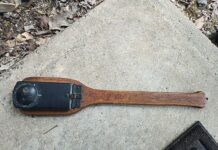“Papa’s enterprise with the little calves was going well. When he brought one home, I was taught how to wean each one. I would pour milk into a pail and then put my hand down into the milk, with only one or two fingers showing. The calf would think my fingers were his mother’s teats and suck on them and take in the milk at the same time. After a few days of this, I would pull the fingers gently away and the little calf would start drinking on his own.”
— “Papa was a Farmer,” Brenda Weisberg Meckler, circa 1905
Part One
Read Part Two: From inventions on farm to tragedies
Read Part Three: From simple to sensational
The true stories of immigrants who came to America at the turn of the century in search of a peaceful place to start a new life have always fascinated me.
Escaping Russia
The story of Brenda “Goldie” Weisberg — who stole across the border from Russia to Germany in 1904 with her parents when she was 4 years old — is one that should be required reading in schools today.
Jewish families escaping Czarist Russia in the early 1900s knew that life was never going to get better unless they broke free from the place they called home. The search for freedom took incredible courage and a criminal act, as leaving the country was punishable by death. Arriving in America, staying a short time in Boston, then Cincinnati, was certainly an eye-opening experience for the little girl and her parents.
Farm life
Accepting an uncle’s offer to take up residence and employment on a 60-acre farm in southern Ohio proved to be both wonderful and challenging, for this family had very little knowledge of American culture, animals or agriculture.
Hoping to earn a bit of money while her husband learned how to farm the land, Goldie’s mother created her own little business of churning butter from the cow’s milk, selling this and eggs to a local market. Her papa read the Ohio Farmer every night.
“He learned something new all the time, he said. Something about rotating crops, and not letting the soil get tired, and maybe planting soybeans to put back nitrogen. He said he’d have to find out exactly what ‘rotating’ meant,” she writes.
One day he showed Goldie young piglets, telling her she would be the one caring for them. “Oh no! Do I have to wean them, too?” she asked, fearing the thought of putting her fingers in the mouth of each squealing little pig. She was relieved to learn they were already weaned.
Language barrier
Not only was this young family struggling to farm 60 acres of land for the first time in their lives, they also were working hard to learn the language, making reading a challenge, as well. Children at school spoke slang which was not taught, adding further confusion for the sweet little girl. The community in rural Ohio had no experience with European Jews, either.
Spending the night with a new friend, the girl’s little brother and his friend picked on her, saying “Howdyadew, Miss Shew!” and such constant teasing that she felt shame, though she had done nothing of which to be ashamed.
Comforting words
A sweet neighbor lady told the little girl, as she worked her way back home from this upsetting visit, “You are very young. As you grow older, you’ll find there’s a lot of pain around, enough for every livin’ creature to have a share.
“For your people, Jewish people, maybe a bigger share than most. You’ll just have to hold your head high and do the best you can, and do all you can to put an end to the hate that poisons so many hearts. Comfort others, and you will be comforted.”
These words helped this little girl, a foreigner to those around her, learn how to live where she had been planted, through no choice of her own. Circumstances placed her with children who had been blessed with the good fortune of being born American, having never known the nightmare of oppression and hunger and fear.
Next week: fires, floods and ‘necktie farmers’













was wodering if you could pass our email on to Judith Sutherland we read a article an illness her son has had to deal with and I have a couple of ?”s for her I have struggled for years with issues nobody has been able to help with.Thank you.Stacey Smith
Just forwarded your contact information and comment to her. Please let me know if there’s anything else I can help with.